Manhattan Loft Gardens by SOM
Next up in our coverage of London 2012 Olympic design is a 135-metre skyscraper by architects SOM full of apartments overlooking the Olympic park.
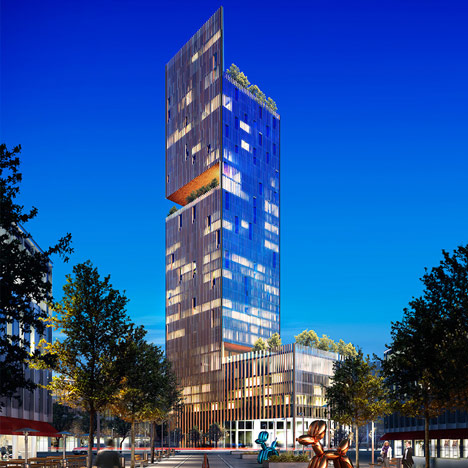
Proposed alongside the Stratford train station, the 42-storey Manhattan Loft Gardens is set to become the tallest building in the area and will contain apartments, a hotel, restaurants and a spa.
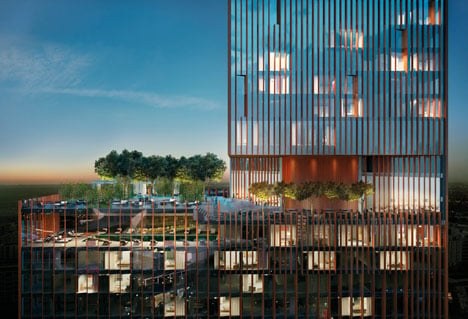
Three large rooftop gardens will slice into the body of the tower so that upper storeys will be supported on a cantilever, while terracotta louvers will shade the glazed facade.
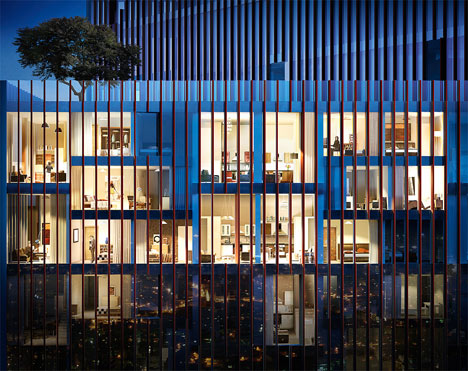
American firm SOM are the architects of the tallest building in the world right now, the Burj Khalifa, which you can see images of here.
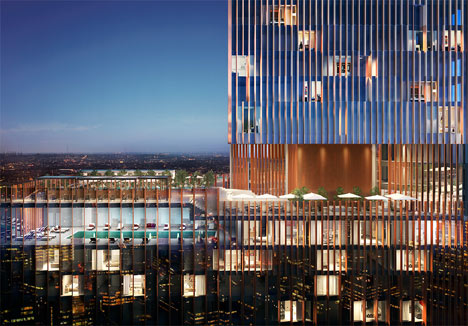
Also new in Stratford is a wall of shimmering metal fish that hides an ugly shopping centre.

Above image is c/o SOM
See all our coverage of London 2012 »
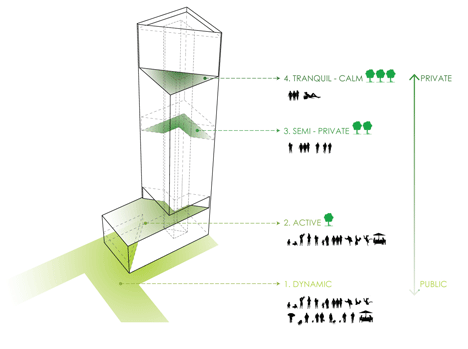
Above image is c/o SOM
Here's some extra information from Manhattan Loft Corporation:
Manhattan Loft Gardens, Stratford, London
Manhattan Loft Corporation Unveils Stunning 42 Storey Cantilevered Tower That Will Offer ‘Loft Living In A High Rise’ In The Heart Of Stratford
20 years after starting Manhattan Loft Corporation and redefining how and where a generation of Londoners lived, CEO Harry Handelsman is ready to it again.
Manhattan Loft Gardens is a stunning cantilevered 42 storey tower featuring a triple height entrance lobby, a seven storey hotel, spa, 2 restaurants, 3 sky gardens and 248 private flats, apartments, lofts and penthouses. Designed by internationally acclaimed ‘tower’ architects SOM, Manhattan Loft Gardens will be located directly between the main entrance of Stratford International station and the new Westfield Stratford City, with views overlooking the Olympic park.
“20 years ago when I started Manhattan Loft Corporation, I offered Londoners a new style of living by developing the concept of loft living” says Harry Handelsman, CEO of Manhattan Loft Corporation. “20 years on I believe that the future for London is in high rise living, and what Manhattan Loft Gardens will do is introduce the concept of loft living within a 42 storey high rise tower. It has not been done before, but I think London is ready for something new, and Stratford is absolutely the place to do it”.
This ‘high rise loft living’ is achieved in part by the extraordinary design of the building and the way single and double height apartments have been ‘interwoven’ throughout the residential part of the tower. This interlocking design feature and the striking cantilevers of the building ensure that volumetric space and natural daylight are maximised throughout. It also creates a staggering choice of 13 different types of dwelling within the building, ranging from single height studio flat through double height lofts right up to triple height penthouses.
At 135m tall – the same height as the London Eye – Manhattan Loft Gardens will be the tallest residential building in the area and will offer the most exceptional views across the Olympic park and the green spaces and waterways of Stratford.
Architecture
The genesis of SOM’s vision is based on three exhilarating open-air spaces carved out of the building’s form. This is achieved through an engineered steel frame that supports the two distinctive cantilevers, creating a modern take on the traditional London garden square in the sky.
The building’s façade maintains a duality of transparent and solid panels in a serrated composition in glass and terracotta. The panels are aligned using a triangulated geometry in plan. From the corner aspects of the building this panel directionality becomes most apparent – only one type of panel may be visible across an entire façade. Movement around the exterior of the building therefore gives a continual interplay between solidity and transparency. The directionality of the solid panels versus the transparent ones greatly reduces the amount of direct sunlight entering the building on certain façades.